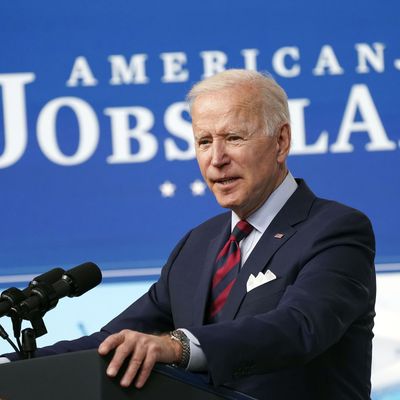
With the upcoming midterm elections likely serving as a referendum on presidential job performance, a lot of attention will be focused on Joe Biden’s approval ratings. They started out higher than what Donald Trump ever achieved, and have changed very little. FiveThirtyEight’s weighted-and-adjusted polling averages had Biden’s approval rating at 53 percent right after Inauguration Day, and they are at 52.9 percent today.
Washington Post political reporter Dave Weigel thinks the key to Biden’s steady popularity could be the low profile he has assumed — relatively low, that is, compared the Sun King standards set by his predecessors, particularly the most immediate one. It continues the approach Biden followed on the 2020 campaign trail, as Weigel notes:
The president has been less visible, and spoken less in public, than any of his immediate predecessors. The light touch has led to unsubstantiated conservative accusations of presidential dementia and questions about who’s “really in charge” of the country; it has fueled some anger on the left while leaving Biden with higher approval ratings among Democrats than Trump tended to hold with Republicans. The president has seen no real drop in his approval rating, no grass-roots organizing against his agenda, and nearly zero appearances in Republican advertising.
Making himself less of a target than is usually the case, combined with pushing through highly popular legislation that showers many voters with material benefits, you can see why he has to some extent flummoxed Republicans. But it should be noted that the GOP has its own problems that are only partially about Biden. Most obviously, they are distracted by internal recriminations over Trump’s extended election coup effort. A new study of Trump supporters from Democracy Corps, however, suggests they are generally in a funk:
The Trump loyalists and Trump-aligned were angry, but also despondent, feeling powerless and uncertain they will become more involved in politics;
Trump’s base saw Biden, as a white man, as not threatening, controlled by others, unlike Obama who represented everything Tea Party-Republicans were determined to fight;
Even Trump’s base is curious about the extent to which they benefit from the American Rescue Plan (ARP) and Biden’s signature program, compared to Obamacare that they viewed as a new entitlement for Blacks and immigrants that must be stopped.
While Republicans aren’t mobilizing against Biden, they still really don’t like him or what he’s doing. The most striking thing about Biden’s approval ratings is the degree of partisan polarization. It’s off the charts, according to Gallup data. When I wrote about this a couple of months ago, the partisan gap in Biden job approval was a record 87 percent (98 percent approval among Democrats, 11 percent among Republicans). The March Gallup numbers put the gap at 86 percent (94 percent approval among Democrats, and 8 percent among Republicans). These are more extreme splits than we saw under the exceptionally polarizing Trump, and they make the partisan atmosphere under George W. Bush and Barack Obama look like Edens of consensus. (Yes, self-identified independents give Biden a temperate 50 percent approval rating, but the majority of these voters are functionally partisan, so this number is likely an averaging of similar extremes).
Put it all together and what we could be seeing is a president who has managed to maintain strong popularity in his own party without energizing the opposition, and that’s a good thing. But ultimately, Biden’s strength in both Congress and in the country depends heavily on almost monolithic support from Democrats. If he has to choose between keeping Democrats happy and persuading Republicans he’s not so bad, the former is more important, given the realities of what it takes to pass legislation in Congress. If he can do that while maintaining the kind of low profile that minimizes GOP hate-rage, that’s even better.
Beyond how much legislation he can get enacted without Republican support, the big question about Biden’s popularity is whether it will be enough to sustain his party in what could be a difficult midterm election. It’s worth looking at the internals of one recent job approval survey:
The good news here for Democrats is that Biden is doing well in categories of voters (e.g., college-educated voters and seniors) who tend to turn out disproportionately well in midterms. The not-so-good realization is that the 2020 polling errors that led to an over-optimistic assessment of Biden and his party’s performance last fall have not yet been figured out or addressed. If you want to put a mental thumb on the scales to erode some of the relatively good polling news for Democrats, nobody’s going to tell you it’s crazy.






























